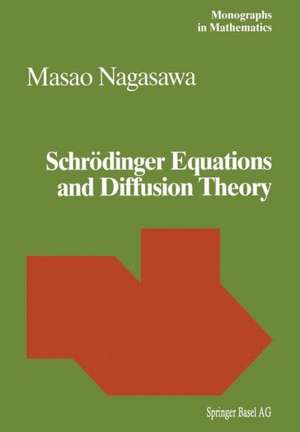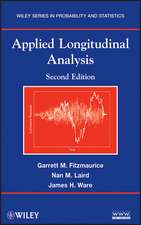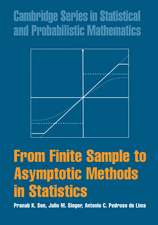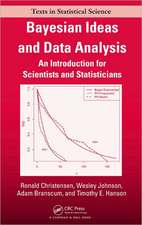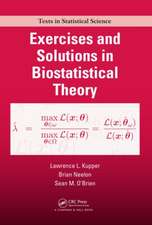Schrödinger Equations and Diffusion Theory: Monographs in Mathematics, cartea 86
Autor M. Nagasawaen Limba Engleză Hardback – iul 1993
The method of relative entropy and the theory of transformations enable us to construct severely singular diffusion processes which appear to be equivalent to Schrödinger equations.
The theory of large deviations and the propagation of chaos of interacting diffusion particles reveal the statistical mechanical nature of the Schrödinger equation, namely, quantum mechanics.
The text is practically self-contained and requires only an elementary knowledge of probability theory at the graduate level.
| Toate formatele și edițiile | Preț | Express |
|---|---|---|
| Paperback (1) | 390.84 lei 6-8 săpt. | |
| Birkhäuser Basel – 27 sep 2012 | 390.84 lei 6-8 săpt. | |
| Hardback (1) | 398.15 lei 6-8 săpt. | |
| Birkhäuser Basel – iul 1993 | 398.15 lei 6-8 săpt. |
Din seria Monographs in Mathematics
- 18%
 Preț: 1120.81 lei
Preț: 1120.81 lei - 18%
 Preț: 1136.74 lei
Preț: 1136.74 lei - 15%
 Preț: 647.27 lei
Preț: 647.27 lei - 18%
 Preț: 1129.96 lei
Preț: 1129.96 lei - 18%
 Preț: 1117.99 lei
Preț: 1117.99 lei - 15%
 Preț: 641.71 lei
Preț: 641.71 lei -
 Preț: 453.76 lei
Preț: 453.76 lei - 18%
 Preț: 892.74 lei
Preț: 892.74 lei -
 Preț: 386.00 lei
Preț: 386.00 lei - 18%
 Preț: 1111.97 lei
Preț: 1111.97 lei - 24%
 Preț: 738.44 lei
Preț: 738.44 lei -
 Preț: 393.90 lei
Preț: 393.90 lei - 15%
 Preț: 651.02 lei
Preț: 651.02 lei - 15%
 Preț: 644.63 lei
Preț: 644.63 lei -
 Preț: 397.38 lei
Preț: 397.38 lei - 15%
 Preț: 648.05 lei
Preț: 648.05 lei - 15%
 Preț: 645.60 lei
Preț: 645.60 lei -
 Preț: 419.91 lei
Preț: 419.91 lei - 18%
 Preț: 964.10 lei
Preț: 964.10 lei - 15%
 Preț: 648.74 lei
Preț: 648.74 lei - 18%
 Preț: 894.46 lei
Preț: 894.46 lei - 15%
 Preț: 665.26 lei
Preț: 665.26 lei - 15%
 Preț: 644.49 lei
Preț: 644.49 lei - 18%
 Preț: 1006.55 lei
Preț: 1006.55 lei
Preț: 398.15 lei
Nou
Puncte Express: 597
Preț estimativ în valută:
76.19€ • 82.74$ • 64.00£
76.19€ • 82.74$ • 64.00£
Carte tipărită la comandă
Livrare economică 22 aprilie-06 mai
Preluare comenzi: 021 569.72.76
Specificații
ISBN-13: 9783764328757
ISBN-10: 3764328754
Pagini: 340
Ilustrații: XII, 323 p.
Dimensiuni: 155 x 235 x 21 mm
Greutate: 0.65 kg
Ediția:1993
Editura: Birkhäuser Basel
Colecția Birkhäuser
Seria Monographs in Mathematics
Locul publicării:Basel, Switzerland
ISBN-10: 3764328754
Pagini: 340
Ilustrații: XII, 323 p.
Dimensiuni: 155 x 235 x 21 mm
Greutate: 0.65 kg
Ediția:1993
Editura: Birkhäuser Basel
Colecția Birkhäuser
Seria Monographs in Mathematics
Locul publicării:Basel, Switzerland
Public țintă
ResearchCuprins
I Introduction and Motivation.- 1.1 Quantization.- 1.2 Schrödinger Equation.- 1.3 Quantum Mechanics and Diffusion Processes.- 1.4 Equivalence of Schrödinger and Diffusion Equations.- 1.5 Time Reversal and Duality.- 1.6 QED and Quantum Field Theory.- 1.7 What is the Schrödinger Equation.- 1.8 Mathematical Contents.- II Diffusion Processes and their Transformations.- 2.1 Time Homogeneous Diffusion Processes.- 2.2 Time Inhomogeneous Diffusion Processes.- 2.3 Brownian Motions.- 2.4 Stochastic Differential Equations.- 2.5 Transformation by a Multiplicative Functional.- 2.6 Feynman-Kac Formula.- 2.7 Kac’s Semi-Group and its Renormalization.- 2.8 Time Change.- 2.9 Dirichlet Problem.- 2.10 Feller’s One-Dimensional Diffusion Processes.- 2.11 Feller’s Test.- III Duality and Time Reversal of Diffusion Processes.- 3.1 Kolmogoroff’s Duality.- 3.2 Time Reversal of Diffusion Processes.- 3.3 Duality of Time-Inhomogeneous Diffusion Processes.- 3.4 Schrödinger’s and Kolmogoroff s Representations.- 3.5 Some Remarks.- IV Equivalence of Diffusion and Schrödinger Equations.- 4.1 Change of Variable Formulae.- 4.2 Equivalence Theorem.- 4.3 Discussion of the Non-Linear Dependence.- 4.4 A Solution to Schrödinger’s Conjecture.- 4.5 A Unified Theory.- 4.6 On Quantization.- 4.7 As a Diffusion Theory.- 4.8 Principle of Superposition.- 4.9 Remarks.- V Variational Principle.- 5.1 Problem Setting in p-Representation.- 5.2 Csiszar’s Projection Theorem.- 5.3 Reference Processes.- 5.4 Diffusion Processes in Schrödinger’s Representation.- 5.5 Weak Fundamental Solutions.- 5.6 An Entropy Characterization of the Markov Property.- 5.6 Remarks.- VI Diffusion Processes in q-Representation.- 6.1 A Multiplicative Functional.- 6.2 Flows of Distribution Densities.- 6.3 Discussions on theq-Representation.- 6.4 What is the Feynman Integral.- 6.5 A Remark on Kac’s Semi-Group.- 6.6 A Typical Case.- 6.7 Hydrogen Atom.- 6.8 A Remark on {?a,?b}.- VII Segregation of a Population.- 7.1 Introduction.- 7.2 Harmonic Oscillator.- 7.3 Segregation of a Finite-System of Particles.- 7.4 A Formulation of the Propagation of Chaos.- 7.5 The Propagation of Chaos.- 7.6 Skorokhod Problem with Singular Drift.- 7.7 A Limit Theorem.- 7.8 A Proof of Theorem 7.1.- 7.9 Schrödinger Equations with Singular Potentials.- VIII The Schrödinger Equation can be a Boltzmann Equation.- 8.1 Large Deviations.- 8.2 The Propagation of Chaos in Terms of Large Deviations.- 8.3 Statistical Mechanics for Schrödinger Equations.- 8.4 Some Comments.- IX Applications of the Statistical Model for Schrödinger Equation.- 9.1 Segregation of a Monkey Population.- 9.2 An Eigenvalue Problem.- 9.3 Septation of Escherichia Coli.- 9.4 The Mass Spectrum of Mesons.- 9.5 Titius-Bode Law.- X Relative Entropy and Csiszar’s Projection.- 10.1 Relative Entropy.- 10.2 Csiszar’s Projection.- 10.3 Exponential Families and Marginal Distributions.- XI Large Deviations.- 11.1 Lemmas.- 11.2 Large Deviations of Empirical Distributions.- XII Non-Linearity Induced by the Branching Property.- 12.1 Branching Property.- 12.2 Non-Linear Equations of Branching Processes.- 12.3 Quasi-Linear Parabolic Equations.- 12.4 Branching Markov Processes with Non-Linear Drift.- 12.5 Revival of a Markov Process.- 12.6 Construction of Branching Markov Processes.- Appendix:.- a.1 Fényes’ “Equation of Motion” of Probability Densities.- a.2 Stochastic Mechanics.- a.3 Segregation of a Population.- a.4 Euclidean Quantum Mechanics.- a.5 Remarks.- a.6 Bohmian Mechanics.- References.
